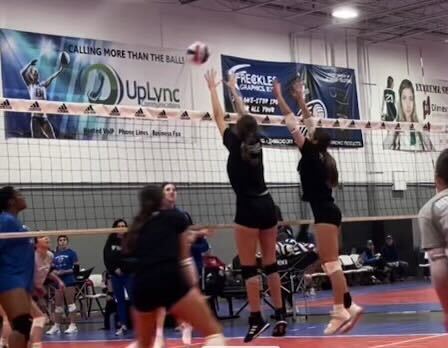Catalina Ufor, volleyball player and sophomore, started playing volleyball when she was 13 years old.
She said she loves how her sport has helped her grow, and learn to overcome obstacles and enjoys how the competition pushes her to get better. While she finds positives, she also said she dislikes the stress that comes with being on this school’s volleyball team.
“School season is just every day, volleyball, volleyball and volleyball,” Ufor said. “Your whole life revolves around volleyball.”
When she first started playing volleyball, Ufor was in Missouri, learning at a club. Now, she plays for Monon Select, a volleyball club in Westfield. As a student-athlete, Ufor said she feels a lot of burden during the school season, but playing for a club allows her to have an opportunity to balance out her life.

“I think the club team is definitely less mentally draining,” Ufor said. “Club season doesn’t revolve around volleyball; it allows you to focus on school and other activities.”
Stephanie Sunday, junior varsity volleyball coach and head coach at Munciana Volleyball Club, said that both school and club volleyball teams have their own merits. However, at school, it’s more about winning, while at the club it’s about learning and less about competing.
“In the club, there’s still a lot more of teaching them new skills and trying to really balance getting playing time for different girls, whereas (at) the school we have to play who we know is going to win the game,” Sunday said.
Similarly, Ufor said she finds more competition in school volleyball teams.
“School volleyball creates a lot of competition with girls our age. Everyone wants to be the best, and sometimes that causes tension in teams. (The) competition puts people against each other to some level,” Ufor said. “The competitiveness really pushes you.”
On the other hand, club soccer athletes have a different perspective. Jashanvir Shergill, Hoosier Premier Academy soccer player and junior, said soccer clubs are a lot more competitive than the school team. Additionally, he said some soccer clubs are more strict than the school team. While Ufor played for both the school team and a club, Shergill wasn’t allowed to try out for the school team.
Shergill said, “I’m not allowed to play for the school team. It’s just a rule for the club I play for.”
He said that soccer teams outside of school put more pressure on their athletes, creating more contention.
“It [club soccer] is just a higher level,” Shergill said. “It’s more intense and competitive.”
Sunday said that athletes who don’t make the school team should still play for a club if they want to play the sport. In addition, she said that club volleyball is a great way to stay in shape during the off-season.
“Between the two, it really depends on whether they make their school team or not,” Sunday said. “If someone doesn’t make their school team, then they absolutely should still go out for the club.”
This may not be the case for soccer, however. Shergill said he loves the level of competition he gets from playing club soccer and how it has helped him grow as an athlete.
Ufor expressed her similar views as Shergill.
“I prefer clubs, I love them,” Ufor said. “It is amazing having the right amount of volleyball balances with the rest of my life. It doesn’t leave me as mentally drained.”




























![Keep the New Gloves: Fighter Safety Is Non-Negotiable [opinion]](https://hilite.org/wp-content/uploads/2024/12/ufcglovescolumncover-1200x471.png)















































![Review: “And the War Came” by Shakey Graves is the perfect year-round album [MUSE]](https://hilite.org/wp-content/uploads/2024/12/IMG_2665.jpeg)
![Review: "Abbott Elementary", a show I can watch with my family and truly enjoy [MUSE]](https://hilite.org/wp-content/uploads/2024/12/unnamed-1.png)
![Review: “We Live in Time” leaves you wanting more [MUSE]](https://hilite.org/wp-content/uploads/2024/12/IMG_6358.jpg)
![Review: The premise of "Culinary Class Wars" is refreshingly unique and deserving of more attention [MUSE]](https://hilite.org/wp-content/uploads/2024/12/MUSE-class-wars-cover-2.png)
![Introducing: "The Muses Who Stole Christmas," a collection of reviews for you to follow through winter [MUSE]](https://hilite.org/wp-content/uploads/2024/12/winter-muse-4.gif)
![Review in Print: Maripaz Villar brings a delightfully unique style to the world of WEBTOON [MUSE]](https://hilite.org/wp-content/uploads/2023/12/maripazcover-1200x960.jpg)
![Review: “The Sword of Kaigen” is a masterpiece [MUSE]](https://hilite.org/wp-content/uploads/2023/11/Screenshot-2023-11-26-201051.png)
![Review: Gateron Oil Kings, great linear switches, okay price [MUSE]](https://hilite.org/wp-content/uploads/2023/11/Screenshot-2023-11-26-200553.png)
![Review: “A Haunting in Venice” is a significant improvement from other Agatha Christie adaptations [MUSE]](https://hilite.org/wp-content/uploads/2023/11/e7ee2938a6d422669771bce6d8088521.jpg)
![Review: A Thanksgiving story from elementary school, still just as interesting [MUSE]](https://hilite.org/wp-content/uploads/2023/11/Screenshot-2023-11-26-195514-987x1200.png)
![Review: "When I Fly Towards You", cute, uplifting youth drama [MUSE]](https://hilite.org/wp-content/uploads/2023/09/When-I-Fly-Towards-You-Chinese-drama.png)
![Postcards from Muse: Hawaii Travel Diary [MUSE]](https://hilite.org/wp-content/uploads/2023/09/My-project-1-1200x1200.jpg)
![Review: "Ladybug & Cat Noir: The Movie," departure from original show [MUSE]](https://hilite.org/wp-content/uploads/2023/09/Ladybug__Cat_Noir_-_The_Movie_poster.jpg)
![Review in Print: "Hidden Love" is the cute, uplifting drama everyone needs [MUSE]](https://hilite.org/wp-content/uploads/2023/09/hiddenlovecover-e1693597208225-1030x1200.png)
![Review in Print: "Heartstopper" is the heartwarming queer romance we all need [MUSE]](https://hilite.org/wp-content/uploads/2023/08/museheartstoppercover-1200x654.png)



